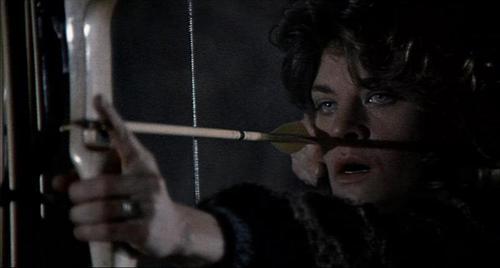
The Osterman Weekend (1983) was the final film that the infamous Sam Peckinpah ever directed. The film is based on the 1972 Robert Ludlum novel of the same name and deals with what the author perceived as the moral and ethical corruption of the CIA during the Cold War with the Soviet Union. Thematically speaking The Osterman Weekend is a pulpy reiteration of The Parallax View (1974). Both films deal with systemic corruption and abuses that see private vendettas and motives as the leading cause of democracy’s deterioration.
Peckinpah’s directorial form and style far exceeds the qualities of the script for The Osterman Weekend. Peckinpah takes a page from Brian De Palma’s book and uses the CIA surveillance equipment as motivation for much of his camera’s gaze, thus situating the audience as a mirrored version of John Hurt’s antagonist. When a character moves from one room to the next the viewer sees Hurt watching that character on a monitor just as the viewer themselves is watching. And while Peckinpah never really has time to explore the moral ramifications of this joint voyeurism the device is still suggestive enough to make the film simultaneously compelling and suspenseful. In addition, Peckinpah’s execution, in terms of coverage and editing, of the action sequences is unparalleled.
The abundance of contrivances and general brevity of The Osterman Weekend are its greatest faults as a technical piece of filmmaking. Coincidence and a lack of character development hardly serve a film that is ostensibly about a television personality attempting to turn three friends from Russian agents to CIA informants. The root of these shortcomings derives from the fact that the source material, already over a decade old at the time, held little relevance when the film began production. The political sensibilities of the early seventies are strikingly out of place in the eighties. Even with some eleventh hour re-writes by the great Alan Sharp (who penned such classics as Ulzana’s Raid and Night Moves), The Osterman Weekend is an awkward and antiquated piece of Cold War paranoia run amok.
While Peckinpah’s bombastically masculine directing style gives The Osterman Weekend plenty of momentum, what is ultimately most memorable about the film is its ensemble cast. The hero of the piece, television journalist John Tanner, is played by Rutger Hauer with Meg Foster and Christopher Starr as his wife and son. Tanner’s “Russian Agent” buddies are played by Craig T. Nelson, Dennis Hopper and Chris Sarandon with Helen Shaver and Cassie Yates as the wives of the latter two pals. On the CIA end of things, John Hurt plays the rogue operative while Burt Lancaster takes on the authority role of the CIA director. This massive ensemble does much to elevate a film that, with regards to plot, is almost absurd to the point of being goofy.
Yet, despite all of these flaws, The Osterman Weekend is actually a lot of mindless fun. It’s also pleasing to partake in Peckinpah’s stylizations without the rampant misogyny and graphic violence of his best films (Bring Me The Head Of Alfredo Garcia and Junior Boner). Besides that, The Osterman Weekend features two elements one isn’t likely to find anywhere else in film. One is the spectacle of Meg Foster shooting CIA agents with a long bow. The second is hearing Burt Lancaster say “You don’t have friends Tanner. You’re on intimate terms with three Russian agents.” in his wholly serious manner.
